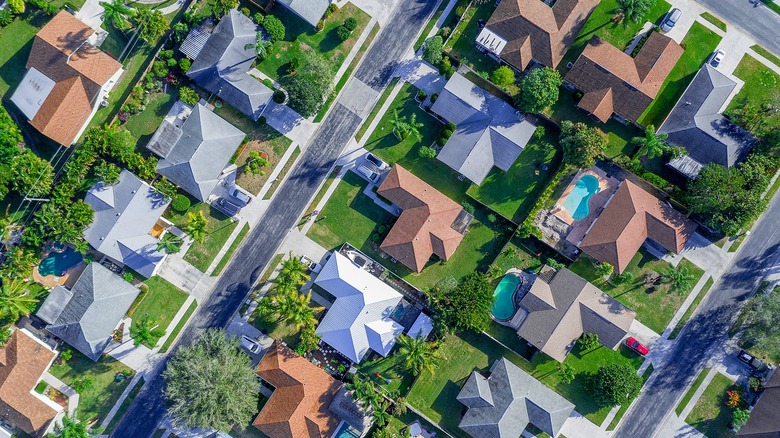How Much Money Does The Average Person Spend In A Lifetime?
As you crunch numbers to create a budget for next month, it may seem impossible to fathom just how much you actually spend in a lifetime and that that number is in the millions. According to an analysis by Investopedia, the average person will spend $3.45 million in their lifetime in pursuit of the American dream. The financial site arrived at this number after estimating the costs of common milestones in a person's life, like getting married, having children, and buying a home, as well as paying for health care and college and saving for retirement.
Of course, these particular aspects of the American dream don't apply to all. For example, what it means to be a DINK today eliminates a big part of that equation: having kids. But while this number may specifically underscore how expensive the American dream has become today, it's also about how expensive things are, in general, and how much we spend on them each day, month, and year. For example, buying a home is relevant to most everyone, regardless if you file your federal taxes jointly or as a single filer, and housing is by far the most expensive purchase you'll ever make and pay for.
Consider, another analysis by lender OneMain Financial arrived at a similar number for lifetime spending as Investopedia, $3.356 million, even though the categories and distribution were a bit different. This said, buying a home was a common category for both, and for Investopedia, home ownership accounted for 23% of a person's lifetime spending while for OneMain, it was 44%.
Spending millions over time
Finding out you'll spend $3 million-plus in your lifetime might be as surprising to learn as some of the financial habits of millionaires themselves, but the math adds up. If you multiplied out how much you spend in a year, you'll likely come up with a similar and surprising number. But, as with the latte effect, where you don't realize how big a difference even small changes to daily spending can have on your savings over time, it might also be difficult to think about your spending in terms of years.
The Bureau of Labor Statistics reported that the average annual expenditures for consumers in 2022 was $72,967, and that this represented a 9% increase from the year before. So, prices continue to rise (though inflation was particularly high in 2022), which you can factor in when thinking about future annual spending. Per BLS, of the 14 spending categories, housing accounted for the largest share at 33.3%, followed by transportation (16.8%), food (12.8%), and personal insurance/pensions (12%). If you were to multiply $72,967 by 45, you'd get $3,283,515, close to both Investopedia's and OneMain Financial's analyses.
Lifetime earnings
A Georgetown University study from a decade ago found that the median lifetime earnings for all workers in the U.S. was $1.7 million, or about half of what the average person is likely to spend in their lifetime. This number, when broken down into a 40-year career equals earnings of ~$42,000 a year, which is close to what the Bureau of Labor Statistics reports for the median annual wage for total occupations in the United States (as of May 2022): $46,310. A home with dual incomes will theoretically then bring home over $92,000.
In BLS' 2022 consumer expenditure survey, the average income before taxes increased by 7.5% to $94,003, with, again, expenditures across 14 categories being 9% higher than the year before at $72,967. This gives consumers just over $21,000 to work with, should something happen to their income, like in the case of a job loss or reduced hours. Broken down, this amounts to $404.54 a week, underscoring how many Americans live paycheck to paycheck, and how even a small change can have a major financial impact.
As for the price of the American dream, or the general belief that with hard work, opportunity, and the freedom to pursue one's ambitions, a person can achieve success and a better life for the next generation, many in America believe it's farther away than ever. A 2024 ABC News/Ipsos poll found that only 27% believe the American dream is still within reach, down 23% from 14 years before.


